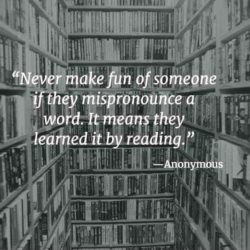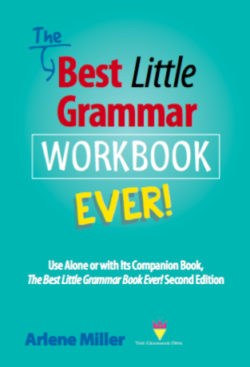 As you can see, the two words in the title of this post are misspelled. I intentionally (of course) misspelled them because that is the way they are usually (mis)pronounced. This post is about some commonly mispronounced words.
As you can see, the two words in the title of this post are misspelled. I intentionally (of course) misspelled them because that is the way they are usually (mis)pronounced. This post is about some commonly mispronounced words.
The word that bothers me the most when mispronounced has to be mischievous. I think just about all my 7th grade students pronounced it incorrectly, but then so does almost everyone else. In fact, my students told me I was wrong when I told them the correct pronunciation of this word. They insisted that it is pronounced mischeevious, with the accent on the middle syllable (wrong) and the i stuck in the last syllable (wrong). Look at the ending of the word, spelled correctly. It is -vous. The final -ous is pronounced -us: famous, glamorous, humorous –– you get the idea. Same with mischievous. It is pronounced the same as mischief, with the accent on the first syllable. Just turn the f into a v and add -us. Some people don’t even turn the f all the way into a v when they pronounce it.
Now that we have that all cleared up, here are some other commonly mispronounced words:
Probably is usually pronounced as a two-syllable word (prob-ly), when it actually has three syllables. Try to leave the middle syllable there.
I often hear often pronounced with the t. The preferred pronunciation is with a silent t.
Across has no t at all, silent or otherwise. It isn’t acrost.
Height doesn’t end with a -th. I don’t know where heighth came from, but I never heard anyone say weighth!
Jewelry is another tricky one. It isn’t jew-lery (separation of church and accessories!); it is jewel-ry, with the jewel generally pronounced more like jule.
Selling your house? You might contact a real-tor, not a re-la-tor. Two syllables only.
Here’s a good one. You pronounce something, but when pronounce turns from a verb into a noun, we lose the second -o. It is pronunciation, not pronounciation.
And you want to order a pre-scription, not a per-scription.
Of course, there are the old standby mispronunciations: liberry and Febuary — instead of library and February.
Grammar Diva News:
 Within a couple of weeks, The Best Little Grammar Workbook Ever! will be available. If you would like a PDF copy of the book (just for you and not to share) so that you can review it on Amazon when it is brand new, contact me at info@bigwords101.com. I still have a few more PDF copies to give.
Within a couple of weeks, The Best Little Grammar Workbook Ever! will be available. If you would like a PDF copy of the book (just for you and not to share) so that you can review it on Amazon when it is brand new, contact me at info@bigwords101.com. I still have a few more PDF copies to give.
And if you live anywhere near Manteca, you will want to check out the BookFest. It is on Saturday, October 8. I will be on Authors Alley and will be giving a presentation at noon.



In Daniel Jones Dictionary, 17th Edition, “probably”, “library” are said to be correct and acceptable if pronounced as two syllable words. The reason stated is that ‘compression’ has occurred in those words which results into the elimination of the syllable which contain the schwa in those words.
Thanks for letting me know. I will keep pronouncing them “correctly.” I was talking about leaving the R out of library. Saying Libry with two syllables is even stranger!
In a sense, the article is a little misleading if you’re a Brit. I discuss pronunciation in my book, particularly the differences in British and American English. I have my own short list of variations and neither are wrong. It’s just down to regional (or transatlantic) differences. But, for a bit of fun, how would you all say these words?
Schedule: is it ‘shedule’ or ‘skedule’?
Vase: pronounced ‘vars’ or ‘veyz?’
Car: is it ka (‘car’, but not sounding the ‘r’), or kar (sounding the ‘r’, as in ‘are’)?
Revenue: Rev – en – new (as in n’you) or rev – en –noo?
Bath: Is it bath (with ‘a’ pronounced the same way as ‘a’ in ‘apple’), or barth?
Often: of – ten, with the t, or of – fen with the f? (already discussed, but for your info, I say it with the ‘t’, but even in the UK there are regional differences as to using the ‘t’ or not))
Advertisement: Is it adver – tiss – ment (stress on ‘ver’), or ad – ver – tize – ment? (stress on tize, as in eyes)?
Duty: Due – tee or doody? (For this one, my American friends, you don’t say this right 🙂
Futile: Few – tile or few – tul?
Tomato: Toe – may – doe or toe – mar – toe?
But don’t take it too seriously. Please.
I get the point that British and American standards and pronunciations differ, as do regions in the United States. And know that I am from New England and live in California now. Here are my answers:
Skedule in America everywhere
veyz
car, although KA is the Boston way! But not mine
revenyou
Bath with a short A
often without the t
advertizement with the accent on Tize
dooty
futil with the short i
tomayto
I am from Australia. I learnt the spelling 60 years ago as jewellery, which is common in the countries of the now defunct British Empire. It was always pronounced with 4 syllables. I learnt jewelry as the USA spelling and 3 syllable pronunciation. Definitely regional dialects.
Definitely lots of regional dialects!
I remember in Grade 1, a girl I was playing with said “I know what that’s called!” as she pointed to her crotch area. I said I do too, “it’s a VAgina,” pronouncing the “gin” as in “begin” with the accent on the first syllable. But I, like Garrison Keillor (thank you Elizabeth Haire), was reading at home and I said the words in my mother’s encyclopaedia as I saw them.
Ha! Thanks for the comment – and the interesting story!
Garrison Keillor did a story once on his program, A PRAIRIE HOME COMPANION, in which he talked about his having grown up as a reader. This hampered his reading aloud in school because of some word pronunciations. His examples included: Egypt (E-Gipped) and island (is-land).
Thanks for the comment. Interesting!
What about kiln, which is also pronounced kill–which is correct? I find most ofTen I hear kiln when it is a reference to pottery, but kill when it is a reference to a lime kiln (kill). I’ve been curious about this one for many years. Thanks!
I have no idea about that one! I have always heard kiln pronounced as kiln, related to pottery. Never heard it pronounced kill, but then I am not a potter.
Now I’m wondering if “kill” is simply a New England thing!
Thanks for the feedback.
Maybe – there are a lot of New England things. I am from New England!
I hear the word often pronounced with a hard “t” which always makes me cringe. My understanding is that the British pronounce it of ten, but I’m not sure why it’s picked up speed in U.S.!
Thank you for the comment. Like many other words and rules, perhaps the T in often is more usually pronounced in Britain. Both pronunciations are apparently acceptable in U.S., but the silent T is more common.
Are there other examples of a silent T? It seems odd that a T would be silent.
Yes, there are many! Listen, hasten. See this website:
https://www.spellzone.com/word_lists/list.cfm?wordlist=337
I hear jewelry mispronounced as jury frequently.
Wow – that is a stretch, but I think I have heard it too!
The pronunciation of “often” is instructive. It’s an example of logic triumphing over convention.
The spelling of “often” strongly encourages giving voice to the “t.” The “t” pronunciation is also supported etymologically: “often” is an extension of “oft” and no one has ever pronounce “oft” “off.”
If we had less literacy, the “silent t” pronunciation would likely be the only pronunciation. But given the way the word looks, we should not be upset when we hear people–readers–say “of ten.”
One extra benefit of the “of ten” pronunciation: Those who pronounce the “t” are certain to spell the word correctly.
Prediction: A hundred years from now, the “t” pronunciation will predominate.
OK, Murray, point well taken. Do you know why the t is silent in the first place? I always learned that it was, so now hearing the t sounds funny to me.
HI Diva,
Heighth probably was formed by analogy with length and width, don’t you think?
What about the word ‘everybody’? Pronounced as 5 syllables, or 4? I vote for 4, especially when writing haiku and needing to account for every syllable.
I think you are probably right about length, width and heighth! Webster gives the pronunciation of “every” with two syllables.Technically, it seems as if it should be three, but it is too easy to let it slide out. So everybody is 4 and you can continue with your haikus, being ableto fit another syllable on that 5-syllable line!
Birds of a feather, Arlene! You managed to work all of my favorite mispronounced woids (errrr…words) into one enewsletter!
Thanks, Linda Jay! Mischeevious just kills me!
What about the invisible “n” in might, night, knight? Makes nighty a homonym with ninety. I can’t recall ever hearing anybody pronounce “might” to sound like “mite.” There’s always an “n” sound added, to make it rhyme with “pint.”
Mike – I don’t think I have heard that….where are you from! 🙂
Midwest. My family is from Missouri, Indiana, Illinois.
I tested my wife, who was born in New York City. “What do you say just before bedtime?” She said, “G’nigh(n)t.” Just a hint of “n” in there.
But she pronounced “might” as “mite.”
There is definitely a regional aspect to it all!
Like Arlene, I’ve never heard those pronunciations.
As I said, Much of it is regional — and what we heard at home as kids.
Thank you, dear girl, for this post. Re-la-tor is one of my pet peeves. It bothers me most when used by real estate salespeople.
Thanks for the comment, Patsy Ann!
I once worked on an author’s short story that was set in the future. The author had made up a lot of words spelled as they were mispronounced. The one that stuck with me was “prolly” (which my instantaneous spell checker just now “fixed” to read “probably”). It was a miserable project and it drove my spell checker nuts.
That would not be a fun project! You’d have to make sure all the made-up words were always spelled the same way Prolly, anyway.
I love this – thank you for posting! Jewelry is one of many commonly mispronounced words. I am a word nerd and very much looking forward to ‘The Best Little Grammar Workbook Ever.’
Thank you so much! Word nerds rule!